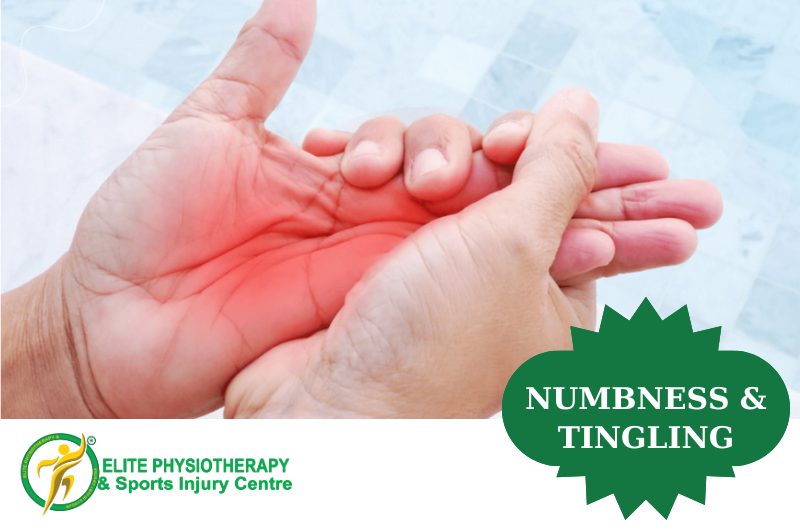
Numbness And Tingling
At Elite Physiotherapy and Sports Injury Centre, we frequently see patients with numbness and tingling. These feelings can be frightening and uncomfortable, so we’ve created this FAQ to assist you understand the possible causes and treatment choices.
Questions
What do numbness and tingling sensations feel like?
Numbness is commonly defined as a loss of sensation in a specific area of the body, whereas tingling produces a "pins and needles" sensation. These symptoms can appear simultaneously or individually and are prevalent in the hands, feet, arms, and legs.
What are the common causes of numbness and tingling?
There are several reasons, including:
1. Nerve compression: Conditions such as herniated discs and carpal tunnel syndrome can compress nerves, resulting in numbness or tingling.
2. Poor circulation: These feelings might be caused by a lack of blood flow to certain areas of the body.
3. Injury: Trauma or repetitive strain on muscles and joints can cause nerve injury or compression.
4. Common medical disorders that might cause nerve problems include diabetes, multiple sclerosis, and peripheral neuropathy.At our center, we regularly treat nerve compression and sports-related injuries that cause these symptoms.
Are numbness and tingling always a sign of a serious condition?
Not necessarily. Temporary numbness or tingling may develop after sitting in one position for an extended period of time or following a hard workout. However, if the symptoms remain or intensify, they may signal a more serious problem, such as a nerve damage or a medical condition like diabetes. Seeking a professional assessment is critical.
What sports activities are likely to cause numbness and tingling?
Athletes who participate in sports that require repeated motion or persistent strain on certain joints are more likely to have these symptoms. For example:
1. Cycling: Compression on the wrists or extended bending of the back might create nerve problems.
2. Weightlifting: Improper technique or misuse can cause nerve compression in the neck or spine.
3. Running: Improper foot alignment or strain on the lower back can cause tingling in the legs and feet.Elite Physiotherapy's team has extensive experience treating athletes with these issues, employing personalized treatment strategies to restore function.
When should I see a physiotherapist for numbness and tingling?
You should consult if:
1. The symptoms last longer than a few days.
2. The numbness or tingling is spreading or increasing in intensity.
3. You have muscular weakness, lack of coordination, or balance issues.Our physiotherapists at the facility can evaluate your symptoms, determine the underlying reason, and provide a specific rehabilitation plan.
How do physiotherapists at Elite Physiotherapy treat numbness and tingling?
Treatment is determined on the underlying cause of your symptoms. Common interventions are:
1. Manual therapy is a set of hands-on procedures used to reduce nerve strain and increase movement.
2. Nerve gliding exercises are specialized movements that assist release trapped nerves and restore normal function.
3. Posture correction and ergonomics are posture adjustments made, particularly for athletes, to relieve nerve pressure.
4. Strengthening and conditioning regimens are designed to increase muscular strength, avoid re-injury, and promote nerve function.Our objective at Elite Physiotherapy and Sports Injury Centre is to ease your symptoms while also improving your overall quality of life.
Can numbness and tingling be prevented?
Yes, with the following precautions:
1. Regular stretching and mobility exercises help to keep muscles and nerves supple.
2. Proper technique and posture for sports and daily activities.
3. Wearing protective clothing when needed, particularly for sports.Our physiotherapists also give preventative advise based on your unique hobbies and lifestyle.
How long does it take to recover from numbness and tingling?
The recovery duration varies depending on the origin and severity of the symptoms. Minor cases may cure within a few days with proper treatment, although more significant nerve damage may take weeks or months to heal completely. Consistent physiotherapy accelerates healing and helps prevent subsequent difficulties.
At Elite Physiotherapy and Sports Injury Centre, we help patients through the whole rehabilitation process to provide the best possible results.
